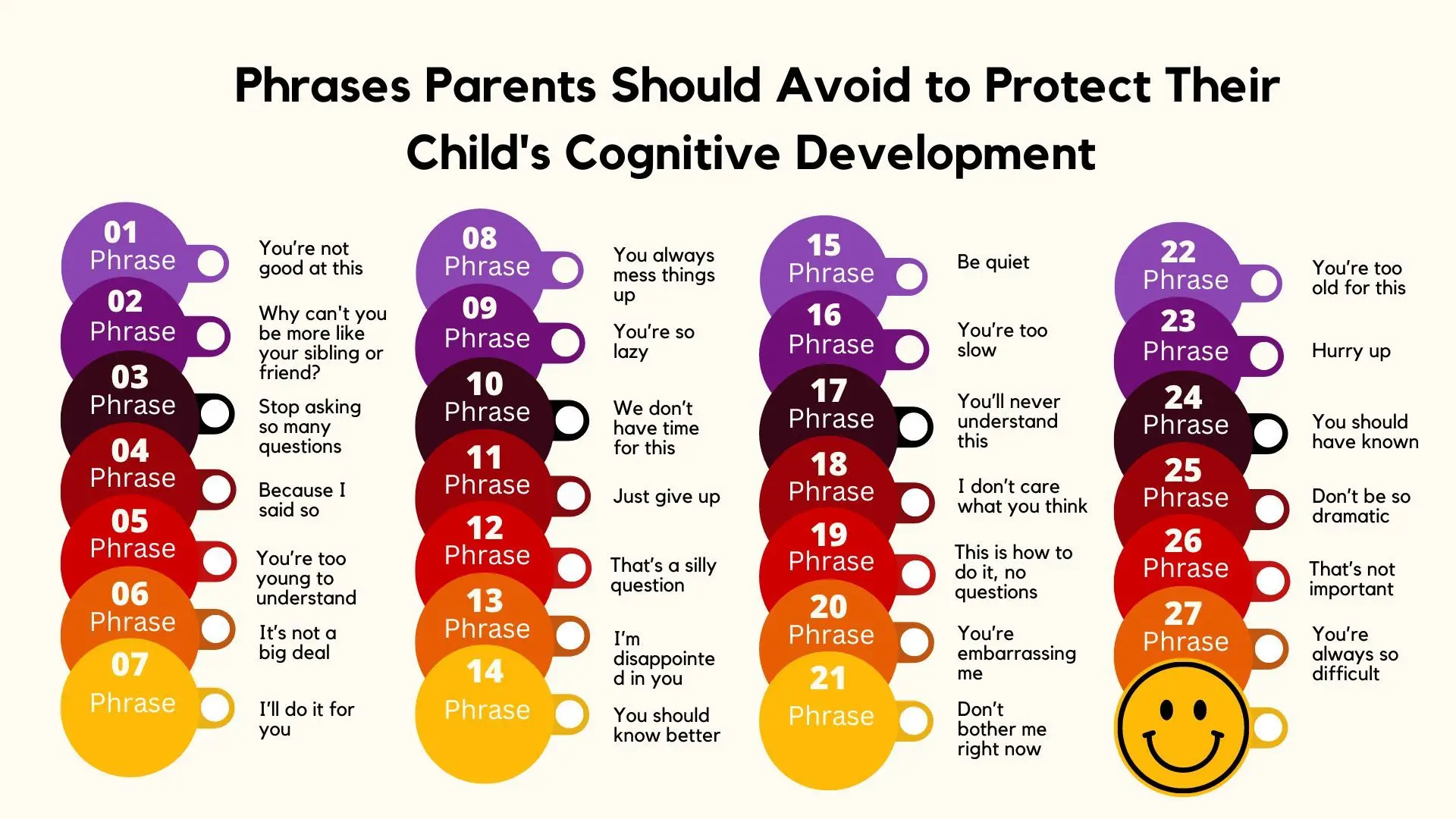Discover 25+ phrases that harm cognitive development in children and learn positive alternatives. Transform your parenting approach today.

While raising your little ones, you might not always realize the power your words hold. The phrases we use daily can significantly impact our children’s cognitive development. Yes, those seemingly harmless comments can shape their thinking, self-esteem, and overall cognitive growth.
In this blog, we’ll explore these phrases to avoid to protect your child’s cognitive development. By the end of this read, you’ll have valuable insights and practical tips to foster a nurturing and growth-oriented environment for your children.
What is Cognitive Development in Children and Why is so Important?
Cognitive development is a critical aspect of your child’s growth. It encompasses how they think, explore, and figure things out. It involves building knowledge, skills, problem-solving abilities, and attitudes that help children understand their surroundings.
From birth to around five years, children’s brains develop faster than at any other time in their lives. During this period, they form crucial cognitive skills such as attention, memory, and reasoning. As parents, your interactions play a pivotal role in shaping these skills, making it essential to be mindful of the language you use.
Phrases Parents Should Avoid to Protect Their Child’s Cognitive Development

Phrase #1: “You’re not good at this.”
Imagine your child trying to solve a puzzle or paint a picture. They might be struggling, but that’s a part of learning. Telling them they’re not good at it can be disheartening and hamper their cognitive development. Instead, promote a growth mindset by saying, “It’s great that you’re learning! “Keep practicing, and you’ll get better.” This shows them that skills develop with effort and persistence.
Phrase #2: “Why can’t you be more like your sibling or friend?”
Comparing your child to others can create feelings of inadequacy and jealousy, affecting their self-esteem and cognitive growth. Each child has their own unique strengths and weaknesses. Celebrate their individuality by acknowledging their efforts and achievements. For example, you could say, “I like how you found your own way to solve that problem!” This helps build individuality and supports cognitive development.
Phrase #3: “Stop asking so many questions.”
Children are naturally curious. Their endless questions are a sign of active cognitive development. Dismissing their questions can stifle their curiosity and eagerness to learn. Instead, nurture their inquisitiveness by answering their questions patiently or exploring the answers together. This not only boosts their cognitive skills but also strengthens your bond with them.
Phrase #4: “Because I said so.”
While it might be convenient to say this during a busy moment, it doesn’t help your child understand the reasoning behind your decisions. Providing explanations helps develop their critical thinking and reasoning skills. For example, instead of saying, “Because I said so,” you could explain, “We’re not going to the park now because it’s time for dinner, but we can go afterward.”
Phrase #5: “You’re too young to understand.”
Underestimating your child’s ability to understand can limit their cognitive growth. Even if a concept is complex, try to explain it in a way they can grasp. This encourages cognitive development and makes them feel valued and respected. For instance, you could say, “This is a bit tricky, but let me explain it simply…”
Phrase #6: “It’s not a big deal.”
Minimizing your child’s feelings and experiences can impact their emotional and cognitive development. Validate their emotions and help them navigate their feelings. This builds emotional intelligence and cognitive resilience. For example, if they are upset about a broken toy, you could say, “I see you’re sad about your toy. Let’s see if we can fix it or find another way to have fun.”
Phrase #7: “I’ll do it for you.”
While it might be quicker to do things for your child, it can hinder their problem-solving skills and independence. Encourage them to try and support them through the process. This promotes cognitive development by fostering resilience and self-reliance. For instance, instead of tying their shoes for them, guide them step-by-step until they learn to do it themselves.
Phrase #8: “You always mess things up.”
Using such a phrase can damage your child’s self-worth and make them fearful of trying new things. Instead, focus on their efforts and guide them through their mistakes. Say, “Let’s figure out what went wrong and how we can fix it.”
Phrase #9: “You’re so lazy.”
Labeling your child as lazy can create a negative self-image. Encourage them to take on tasks by making them enjoyable and acknowledging their efforts. Try saying, “I know you can do this, let’s start together.”
Phrase #10: “We don’t have time for this.”
Rushing through activities can deprive your child of valuable learning opportunities. Make time for their interests and involve them in your schedule. For instance, “We can spend a few minutes on this now and then finish it later.”
Phrase #11: “Just give up.”
Telling your child to give up can undermine their perseverance and cognitive resilience. Encourage them to keep trying by saying, “Take a break if you need to, but let’s not give up.”
Phrase #12: “That’s a silly question.”
Belittling their questions can discourage their curiosity. Welcome their questions with, “That’s a great question!”
Let’s find out the answer together.”
Phrase #13: “I’m disappointed in you.”
Expressing disappointment can be harsh on their emotional and cognitive development. Focus on the behavior, not their worth, by saying, “I’m not happy with what happened, but I know you can do better.”
Phrase #14: “You should know better.”
Unrealistic expectations can pressure your child and hinder their cognitive growth. Guide them instead with, “Let’s talk about why this happened and how we can avoid it next time.”
Phrase #15: “Be quiet.”
Stifling your child’s expression can affect their cognitive and communication skills. Encourage them to speak up by saying, “I want to hear what you have to say.”
Phrase #16: “You’re too slow.”
Criticizing their pace can impact their confidence. Be patient and supportive with, “Take your time, you’re doing great.”
Phrase #17: “You’ll never understand this.”
Limiting beliefs can hinder their cognitive potential. Encourage a growth mindset by saying, “Let’s break it down together and see if we can understand it.”
Phrase #18: “I don’t care what you think.”
Dismissing their thoughts can affect their cognitive and emotional development. Value their opinions by saying, “I’m interested in your perspective.”
Phrase #19: “This is how to do it, no questions.”
Discouraging inquiry can stifle critical thinking. Encourage questions with, “This is one way to do it, but let’s explore other methods too.”
Phrase #20: “You’re embarrassing me.”
Making them feel ashamed can inhibit their cognitive and emotional growth. Support them by saying, “Let’s talk about what happened and how we can handle it differently next time.”
Phrase #21: “Don’t bother me right now.”
Dismissing their need for interaction can impact their cognitive engagement. Allocate time for them by saying, “I’m busy now, but let’s talk about it in a little while.”
Phrase #22: “You’re too old for this.”
Criticizing age-appropriate behaviors can limit their cognitive exploration. Encourage their interests by saying, “Everyone enjoys different things at different ages.”
Phrase #23: “Hurry up.”
Rushing them can cause cognitive stress. Be patient with, “We have some time, let’s do our best and finish this together.”
Phrase #24: “You should have known.”
Blaming them for not knowing can create self-doubt. Instead, guide them by saying, “It’s okay, let’s learn from this together.”
Phrase #25: “Don’t be so dramatic.”
Dismissing their emotions can impact their emotional and cognitive development. Validate their feelings with, “I understand you’re upset. Let’s talk about it.”
Phrase #26: “That’s not important.”
Devaluing their interests can stifle cognitive curiosity. Show interest by saying, “Tell me why you think this is interesting.”
Phrase #27: “You’re always so difficult.”
Labeling them as difficult can affect their self-image. Focus on the behavior with, “I see you’re having a hard time, how can we make this easier?”
Our words greatly influence our children’s cognitive development. By avoiding negative phrases and using supportive language, we create an environment that nurtures learning, curiosity, and emotional well-being.
What Does That Little Brain Want to Listen for Proper Growth?

The answer is Positive language only. Using positive and encouraging language can significantly enhance your child’s cognitive development. Here are some examples:
- “You did a great job!” – Acknowledges their effort and achievements.
- “I believe in you.” – Builds their confidence and encourages perseverance.
- “Let’s work on this together.” – Encourages problem-solving and teamwork.
- “What do you think?” – Encourages them to express their thoughts and opinions.
- “That’s a creative idea!” – Fosters creativity and innovative thinking.
Positive reinforcement not only boosts their cognitive development but also strengthens your relationship with your child.
What Do We Parents Need to Do?
As parents, it’s important to recognize and change any detrimental language habits. Self-reflection is key to growth. Here are some tips:
- Be mindful of your words. – Think before you speak and consider how your words might affect your child.
- Practice positive communication. – Use encouraging and supportive language.
- Seek feedback. – Ask your child how they feel about your communication style.
- Educate yourself. – Read books and articles on positive parenting and cognitive development.
- Be patient with yourself. – Changing habits takes time. Be gentle with yourself as you learn and grow.
Conclusion
Our words hold immense power in shaping our children’s cognitive development. By avoiding harmful phrases and adopting a more positive and supportive communication style, we can foster an environment that encourages learning, curiosity, and emotional well-being. Remember, it’s not just about avoiding negative phrases but also about actively using language that nurtures their growth.
Take a moment to reflect on your daily interactions with your child. Are there ways you can shift your language to be more supportive and encouraging? By making these small changes, you can have a profound impact on your child’s cognitive development and overall happiness.
Now that you’ve learned about the impact of language on cognitive development, it’s time to put this knowledge into practice.
I would love to hear your thoughts and experiences in the comments.
You may also be interested in : Child Development from 0-18 years (Detailed Guide)